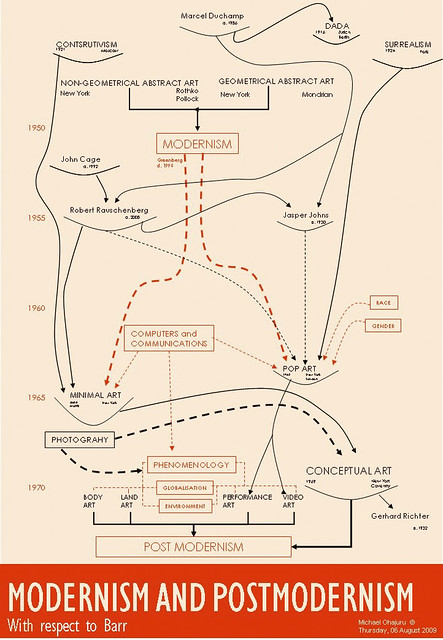Preparing for my first
Image of the Black in London Galleries tour I looked at how the postmodern influence behind the Sainsbury Wing extension to the National Gallery was rooted in
Robert Venturi’s 1972 influential work
Learning From Las Vegas.
 |
Welcome to Fabulous Las Vegas sign,
Betty Willis 1959
|
His radical ideas from consideration of the famous
Las Vegas Strip with its iconic welcome sign gave way to a new way of thinking about urban architecture as he parodied modernism’s minimalism saying
Less is a Bore! The Strip inspired him as buildings made their function and presence known through extravagant individual signage on its buildings.
 |
Stardust sign and hotel front,
Las Vegas, 1961 |
Where modernism was about space Venturi argued postmodernism was about communication. A
Mies van der Rohe modernist building had an intrinsic indifference to its history and location, it could be in any urban space, leading to the modern city having a uniform look and feel regardless of location from London to Los Angeles (or Liverpool).
 |
| The Mint. Las Vegas 1957 to 1989 |
Postmodernism was about context with its buildings fitting in a fun, idiosyncratic way within the settings they found themselves, letting the world know who they are. A postmodernist building fits within its environment. With its name etched into the front and the back of the Sainsbury Wing leave the viewer in on doubt what the building is.
The Sainsbury Wing's eponymous lettering minded me of the lettering I'd seen in the entrance to the British Libaray and of a newly built care centre in my home town Liverpool which I'd often stopped to admire.
 |
Sir Colin St John Wilson (1922 – 2007)
British Library June 1998
|
Liverpool Primary Care Trust
Edge Hill Health Centre
Taylor Young Practice 2013
|
To conclude, from prestigious public buildings exemplified by National Gallery's Sainsbury Wing extension and The British Library in London to the functional local buildings like the Health Centre in Liverpool Robert Venturi's
Learnings From Las Vegas have been applied. The idea he first highlighted in 1960s Las Vegas urban development finds a place in the buildings of the 21st century from Las Vegas to London to Liverpool.
BTW ONE the National Gallery's eponymous gold sign on the frieze of its portico is very recent postmodern addition after the Sainsbury Wing
 |
Portico of the National Gallery,
Trafalgar Square |
BTW TWO This frieze postmodern signage ain't that new......
 |
| Pantheon, Rome, 118–128 AD |
 |
| Santa Marie Novella, Florence, 1456–1470 |
For my take on the Santa Marie Novella signage see my post
Taken Back to My Comparative Roots
BTW THREE The black presence in the Venturi's Sainsbury Wing is to be found in its faux
Egyptian columns which parody the classical Corinthian columns and pilasters and remans us of the African influence on the western canonical art to be found in the Sainsbury Wing. A controversial debate intuited with Dr Martin Bernals'
Black Athena hypothesis.
 |
| Sainsbury Wing Egyptian Columns (detail) |














No comments:
Post a Comment